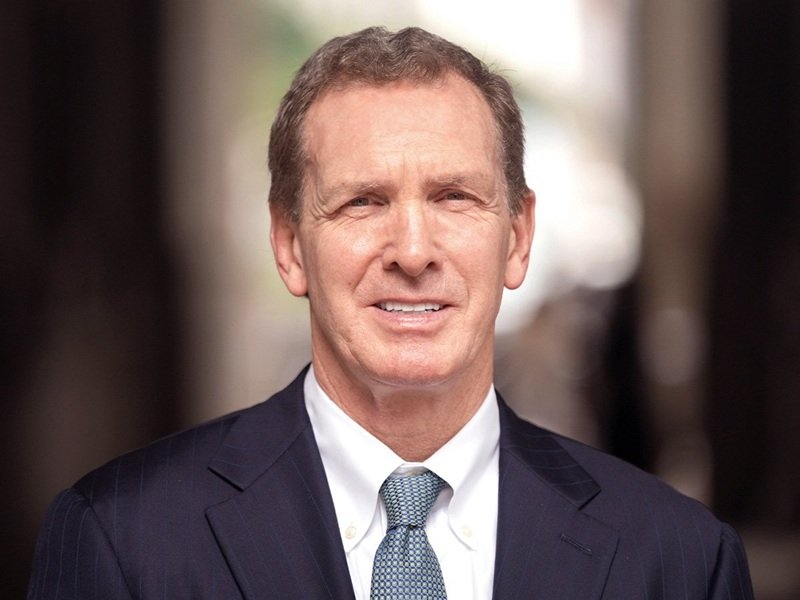What lured Steve Meier
➡️ Save Your Seat for Markets Group’s Annual Tri-State Institutional Forum
On Nov. 8, 2025, Steven Meier, the Chief Investment Officer of New York City’s five pension system, posted his last LinkedIn update as CIO of the investment office with $317 billion assets under management:
“Sharing that yesterday was my last day as Deputy Comptroller and Chief Investment Officer for the NYC Retirement Systems. It was truly and honor to serve the pension beneficiaries and plan participants of the greatest city in the world for over three years.
I’m incredibly grateful for the engagement and support of the thousands of investment professionals at the over four hundred IMs and GPs that help deliver strong risk-adjusted returns for NYC’s hard working heroes and civil servants. I’ll sincerely miss working with both my former colleagues at NYC’s Bureau of Asset Management and the many Trustees from the five pension plan boards I was privileged to support and service. My hope and expectation is for my prior teammates to experience continued success in implementing and executing the strategic priorities initiated while I was CIO, and I wish future NYC CIO’s the same success and wonderful experience I enjoyed while serving in that role.“
It will be a few weeks before he’s allowed to disclose the name of his next employer. But we interviewed him recently and found out a bit more information.
Here’s what we know: Steven Meier won’t be an allocator in his next role. And the timing of his departure from his role as chief investment officer of NYC’s five-pension aggregate, which, at that date, amounted to around $317 billion, has a lot to do with the fact that Comptroller Brad Lander will be leaving.
“As we approach a turnover of the comptrollership, it just seems to me to be a logical point for me to maybe look at other challenges and pursue other opportunities,” Meier said during a phone interview.
Not exactly at liberty to disclose the name of the firm just yet, we had a pleasant conversation that was a delightful mixture of background history and guessing game.
He said it’s quite common for CIOs to turn over when comptrollers leave office, and working with Landers had been pretty smooth, as the comptroller took a laisses fair approach, (outside of prompting the team to move toward decarbonizing the portfolio.) Meier had been there since August of 2022. The 1-year returns, net of fees, filed June 30 were 10.3% , and 9.4% for the three year mark, which solidly beat the 7% benchmark.
In a related story, we insinuated that the CIO might have been overwhelmed by the task of preparing meeting materials for five separate pension boards each month. Meier told Markets Group, “Listen, I want to be perfectly honest and upfront. I absolutely love this job. This is the best job I’ve ever had in my over 40-year career. It’s been wonderful.”
He’s not leaving because he is overwhelmed. But it is quite a job. As CIO of the third largest pension system in the United States, he said he has been working 12 hour days, every day, in the office while trying to catch up on investment news over the weekends, each weekend. And prep for five different investment board meetings, (each month except for August,) for each of the separate pension systems. One of his favorite parts of the job is engaging with the 50 trustees (as well at the 5 general consultants, and a matrix of 9 specialty consultants and the staff of 130.)
“There’s a level of complexity to what we do, but it certainly works. That level of complexity has nothing to do with my desire to look for other challenges,” he said.
He won’t be leaving Manhattan. It’s one of his favorite places to be, and he feels as if he’s meant to be there.
He said his new role will have a component of AI and technology.
“Honestly, it’s really going to be about working with institutional investors in the States and probably around the world just in terms of helping support them making better decisions: investment decisions, allocation decisions. Listen, my first love is being an institutional investor and working with clients that actually have responsibility for large portfolios and have a level of complexity that really warrants a high touch.”
In fact, in he has already accepted a position as vice chair of an asset management firm.
“I’ll be the vice chair of an institutional investment group at a large investment management firm here in New York,” he said.
“Like Ash Williams?” I asked.
“Exactly like Ash Williams,” he said.
(I checked in with Williams, who said, to his knowledge, Meier isn’t taking over his role as vice chair of JP Morgan Asset Management.)
Who is he?
Meier is the type of guy who likes to examine the interconnect-ability of things, such as, how do non-US markets react when the US either sells off or rallies? (NYC’s 2025 Returns for Emerging Markets and Developed ex US equity were 14% and 16.2% respectively.)
He has Andrew Ross Sorkin’s latest book, 1929, on his bed stand, alongside The Secret of Secrets by Dan Brown. He worries about the level of credit exposure in the markets and the level of deficit spending in the U.S. and other sovereign nations around the world.
His wife of 31 years, from Brooklyn, his son, in venture capital, and his daughter, an EMT, are all living in New York. Born in New Jersey, shortly after graduating high school, his uncle (who had worked at the investment bank Tucker Anthony in New York) bought him a subscription to the Wall Street Journal. He read it until he started to understand it and learned “where the juice was” in the market section.
He went to Indiana University, the Kelly School of Business, and devoured trade magazines about institutional investors. He became a junior trader at Merrill Lynch in the 1980’s, rose to head of global fixed income financing and matched book trading, and then went on to similar roles at Oppenheimer Capital and Credit Suisse in New York. Then he left for State Street in Boston for 12 years, working as the executive vice president and CIO of Global Cash Management and then Global Fixed Income, Currency and Cash. There he also spent time on the board for Catholic Schools and learned from Peter Lynch of Fidelity. Oaktree’s Howard Mark was another influence, as well as former CalPERS CIO Ted Eliopoulos.
In Connecticut, he was Assistant Treasurer and Interim Chief Investment Officer for the State and gained a reputation for putting things in order. He worked closely and directly with Connecticut’s elected Treasurer, Shawn Wooden, where one of the very few “Sole Fiduciary” governance models is still in existence in the US. (Compared to the NYC model of working with five independent pension fund boards). Wooden has since become a partner at Apollo, and the two still remain in contact.
Then Meier came back to New York in August of 2022, during the worst year for the markets since the Great Financial Crisis.
A Dose of Exposure
In a pension system that competes with Wall Street for top talent and can only promise government salaries, NYC pensions have always leaned into the green, the grey and the grounded for its employee investment team base. Meier doesn’t believe in cloistering away. He wants to expose his staff and his board members to great thinkers as much as possible. He brought more worldly exposure to the hard working team, in part, by instituting Friday Zoom meetings that scheduled leading investors and living legends from across the industry to speak with pension representatives.
The list of guest speakers, names withheld out of discretion, includes a bevy of talent from former US Treasury Secretaries, to a former Vice President of the United States, chief executive officers and chief investment officers of the top Wall Street firms, research scholars and other notables.
“It gives our external managers the ability to interface directly with our trustees,” said Meier.
Since 2022, he’s focused on moving away from a siloed mentality toward a Total Portfolio Approach in order to collaborate across teams, integrate and cross train the investment staff, something that is common practice in the APAC region, but relatively new to the United States. As CIOs consider it, each take their own approach toward it.
For Meier, it started with developing inclusive, risk-aware systems.
“A big part of that has been building up an analytical framework and quantitative tools that can actually help us make better decisions in terms of portfolio construction, and really better understand the exposures, the alpha drivers, and ultimately the performance of the plan,” said Meier.
To explain his approach, Meier referred to the Japanese term “Kaizen,” in which a team focusses on excellence and small incremental returns and improvements to get to the bigger wins, since an improvement worth 50 basis points can mean a lot for a portfolio worth more than $300 billion.
The Staff
Infrastructure was the alternative investment that made a difference in the portfolio (gaining 11.9% during FY 2025), and Meier credits that team for its savvy investments, due in part to Petya Nikolova, who has been a bastion at the pension since 2012, and before that, also worked as a director at WestLB; the vice president of infrastructure at the Bank of Ireland; and as vice president of global energy and transportation for Mbia, where she specialized in credit analysis and structuring infra and public power deals.
“I also think infrastructure is a real success story for us. I also have to tip my hat to Petya Nikolova, who’s our deputy chief investment officer, as well as our asset class head for infrastructure. She and our team have done a fantastic job. We continue to dramatically outperform not just our benchmarks but our peers in that area,” he said.
Another positive area was private credit, headed by Tina Suo, who has been at the fund since 2019, worked as a senior director at New York Life, and held various positions at PIMCO and Goldman Sachs.
“Private credit as well under Tina Suo has done really well. We’ve been putting more money to work there. Yields and returns have been really strong.”
Where large pension systems find it difficult to be tactical due to their size, NYC hires multi-strategy managers in the private credit space to provide strategic moves for the right opportunities. “I think co-investment in funds and general partnerships makes sense in the private credit space,” said Meier.
Meier noted that the real estate portfolio is still recovering from the COVID downturn, and private equity’s current lack of distributions and exits could put allocators in a good negotiating position for size and scale with better managers. In the future, he sees the fund focusing on fees, and a widening of term premia. “Base rates are going to be higher than people had expected,” he said.
The system takes an integrated approach when it comes to ESG (environmental, social and governance) investments. Led by John Adler, three of the five funds have also adopted a net zero goal. Adler has a strong passion for shareholder engagement opportunities at NYC’s portfolio companies as a long-term investor. And, since 95% of the beneficiaries are union members, the perspective also helps to alleviate risk, he said.
“We look at it through a lens of mitigating our litigation risk, our reputational risk, our regulatory risk. We do a lot of things in that ESG space that’s focused on labor and the ability to form a union and bargain collectively,” said Meier.
For private credit investments, Meir developed a new approach by hiring a former research director from Moody’s, Chris Holmes, to head short term public fixed income investments, which the team handles internally.
“Some of the best practices there are really making sure that you review all the documentation,” said Meier. If it’s an asset-backed commercial paper conduit, for example, you make sure that there’s a liquidity support provider, and that you understand the underlying collateral.
The pension system is also positioned with cash reserves, as well as handling the city’s cash management, with a process set to capture the movements in interest rates.
Tech advancements
In regard to the analytical developments, to get ahead of risk, (since he took the post during the summer of 2022, the worst year for the market since the Great Financial Crisis,) Meier asked his chief risk officer at the time, Ed Berman, to put together dashboards that tracked risks and performance on a daily basis.
“Ed took it 10 steps further and began to develop this analytical suite and these quantitative tools that are just absolutely extraordinary. I believe we’ve got probably the best insights into our portfolios and our managers and our performance than perhaps anyone else out there in the industry,” said Meier.
The technology that the team developed internally gives direction on where things can be improved. With public equity, for example, it might suggest a change in portfolio construction to gather more alpha, or take into account a significant allocation to passive investments, or a focus on alpha by consolidating managers with a careful portfolio construction model.
Future Alpha
The portfolio is well positioned for positive alpha returns in the future, due in part to a significant change to a piece of New York legislation called the basket clause. In the past, the clause had limited the amount of money that could be invested in alternative or private assets to 25%, and when it changed to 35%, it freed Meier to do an asset allocation study and then invest in private equity during a time when investors were pulling back from the market. The timing gave him a stronger negotiation position, better legal terms, and better economics, with “a significant amount of co-investment with the very best managers out there,” he said. Some of the new co-investments will take seven to ten years to mature, but Meier is confident that they will provide very positive returns.
There’s still room in the portfolio for more investment, but Meier will leave that up to the next CIO.
“That’s still another 5+% we can allocate today into alternative assets that will be differentiators and alpha drivers for performance down the road,” he said.
Stay tuned and we’ll release the news on which firm he’ll be joining.
Related stories:
Inside CIO Steven Meier’s bold push to transform NYC Retirement System’s portfolios with TPA rigor
Exclusive: NYC CIO Steven Meier Discusses Strategies and Sectors for AI Investments













